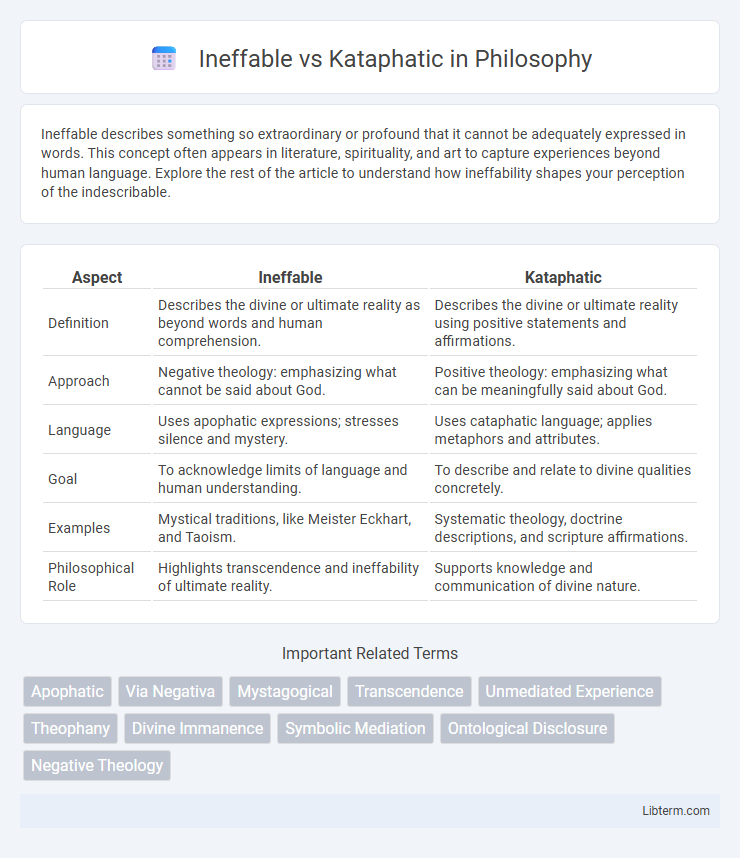Ineffable describes something so extraordinary or profound that it cannot be adequately expressed in words. This concept often appears in literature, spirituality, and art to capture experiences beyond human language. Explore the rest of the article to understand how ineffability shapes your perception of the indescribable.
Table of Comparison
| Aspect | Ineffable | Kataphatic |
|---|---|---|
| Definition | Describes the divine or ultimate reality as beyond words and human comprehension. | Describes the divine or ultimate reality using positive statements and affirmations. |
| Approach | Negative theology: emphasizing what cannot be said about God. | Positive theology: emphasizing what can be meaningfully said about God. |
| Language | Uses apophatic expressions; stresses silence and mystery. | Uses cataphatic language; applies metaphors and attributes. |
| Goal | To acknowledge limits of language and human understanding. | To describe and relate to divine qualities concretely. |
| Examples | Mystical traditions, like Meister Eckhart, and Taoism. | Systematic theology, doctrine descriptions, and scripture affirmations. |
| Philosophical Role | Highlights transcendence and ineffability of ultimate reality. | Supports knowledge and communication of divine nature. |
Introduction to Ineffable and Kataphatic Concepts
Ineffable concepts refer to aspects of experience or divinity that are beyond human language and comprehension, emphasizing the limitations of verbal expression. Kataphatic theology, in contrast, uses positive affirmations and descriptive language to articulate attributes of the divine, making abstract ideas more accessible. Understanding the distinction between ineffable and kataphatic approaches is essential in exploring how different traditions convey spiritual and metaphysical truths.
Defining the Ineffable: Beyond Expression
The ineffable defines concepts or experiences that transcend verbal articulation, eluding precise description even through metaphor or analogy. In contrast to kataphatic theology, which uses positive affirmations and descriptors to convey the divine, the ineffable emphasizes silence, mystery, and the limitations of language in capturing ultimate reality. This distinction highlights how ineffability challenges semantic boundaries by pointing to realities that exist beyond human expression and cognitive grasp.
Understanding Kataphatic: Affirming the Divine
Kataphatic theology emphasizes affirming the divine through positive descriptions and attributes, allowing believers to comprehend God by highlighting qualities such as love, mercy, and justice. This approach contrasts with ineffable theology by using symbolic language and imagery to make the divine more accessible and relatable. By focusing on what can be expressed about God, kataphatic theology nurtures a deeper spiritual connection and understanding within religious practice.
Historical Roots of Ineffable and Kataphatic Theology
Ineffable theology traces its roots to apophatic traditions in early Christian mysticism, emphasizing the incomprehensibility of God and relying on negation to express the divine's transcendent nature. Kataphatic theology, originating from biblical exegesis and patristic writings, uses positive affirmations and symbolic language to describe God's attributes and presence. The historical development of these approaches reveals a dynamic interplay between the acknowledgment of divine mystery and the human desire for relatable theological expressions.
Ineffable vs Kataphatic: Core Differences
Ineffable theology emphasizes the divine as beyond human language and comprehension, asserting that God's essence cannot be adequately described or captured through words. Kataphatic theology, by contrast, uses positive affirmations and descriptive language to articulate the attributes and nature of God through scripture, tradition, and reason. The core difference lies in ineffability prioritizing mystery and silence about the divine, while kataphatic approaches focus on accessible, affirmative knowledge and imagery.
Philosophical Implications in Religious Thought
Ineffable concepts in religious philosophy emphasize the limitations of language in conveying the divine, highlighting an ultimate reality beyond human comprehension and descriptive capacity. Kataphatic theology, by contrast, asserts that positive affirmations and attributes can meaningfully describe God, promoting a participatory relationship between the divine and believers through accessible symbolism and metaphor. These contrasting approaches shape theological discourse by balancing transcendence with immanence, influencing doctrines of revelation, worship, and the nature of spiritual experience.
Examples in Mystical and Theological Texts
Ineffable experiences, described in texts like Pseudo-Dionysius's "The Mystical Theology," emphasize the divine as beyond human language and comprehension, highlighting the limits of kataphatic (positive) theology. Kataphatic theology, evident in Thomas Aquinas's "Summa Theologica," uses affirmations and analogies to describe God's attributes, such as goodness and omnipotence, making the divine accessible through positive affirmations. Both approaches appear in mystical works, with Meister Eckhart's sermons blending ineffable union with God and kataphatic descriptions of divine action.
The Role of Language in Spiritual Experience
Ineffable spiritual experiences emphasize the limitations of language, conveying that certain divine realities transcend verbal expression and resist categorization. Kataphatic theology relies on positive affirmations and descriptive language to articulate God's nature, enabling believers to connect through symbolic imagery and metaphors. The dynamic tension between ineffability and kataphatic language shapes how spiritual experience is communicated, balancing mystery with meaningful discourse.
Practical Applications in Modern Spirituality
Kataphatic spirituality employs imagery, symbols, and affirmations to deepen personal connection with the divine, making it accessible in meditation, prayer, and ritual practices. Ineffable spirituality emphasizes direct, non-conceptual experience of the divine beyond words, often found in contemplative silence, mystical experience, and transcendent states. Modern spiritual practices integrate kataphatic methods for structured engagement and ineffable approaches for experiential depth, balancing cognitive and intuitive elements in personal growth.
Conclusion: Reconciling the Ineffable and Kataphatic
Reconciling the ineffable and kataphatic approaches requires acknowledging that divine experiences transcend linguistic expression while also appreciating the value of affirming positive descriptions. Embracing both perspectives allows spiritual understanding to be enriched by the mysterious, unknowable essence and the accessible imagery or language that conveys aspects of the divine. This balanced synthesis fosters a deeper theological dialogue that respects both the limits of language and the desire for relational knowledge.
Ineffable Infographic

 libterm.com
libterm.com